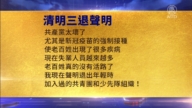【新唐人2013年06月08日讯】中国大陆每年一次的高考已经开始。然而,并非所有高三应届生都将参与到这场大型考试中,许多人在没开始的时候就选择了放弃。近年来高考人数连年下降。今年与去年相比,下降了3万。此外,还存在大量的高考弃考人数。弃考人数今年可能将达到100万。农村学生和精英家庭学生是弃考的两大群体,但是原因却截然不同。
据大陆媒体报导,高考人数的变化,在2009年成为分水岭,当年全中国有1020万人报名参加高考,高考人数首次下降,有84万高中应届毕业生没有参加高考。
2009年之后,高考人数连年下降,从2010年的957万人到2011年的933万人、2012年的915万人,今年则再减少了3万人。弃考人数在3年内保持在80万左右的规模。近年,弃考人数以每年接近10万人的速度在增加,今年全中国弃考学生大约为100万人。
报导说,弃考学生中,农村孩子占了绝大多数。弃考学生因就业难而弃考,这部分估计占60%。
“北京外语大学”新闻学副教授乔木认为,就业难和学费贵,是弃考的两个主要原因。
北京外国语大学副教授乔木:“一方面是从长远来看,就业很难,第二点,本身他想着考上以后也要交学费。特别像中国这两年大学扩招主要针对的是二、三本,就是地方院校的扩招非常多,他们会吸纳大多数学生。而这个二、三本院校收费都不低。所以可能眼前的利益交不起学费,长远来说不好就业。就使得他们放弃。”
乔木分析,大学毕业生就业难,存在短期和长期的原因。短期的是指结构性矛盾。前两年中国经济高速增长,今年以来消费乏力,特别是随着金融危机仍然没见好转,最终影响到中国出口和制造业。从长远来看,中国存在一些制度性的矛盾,比如说户籍制度。
北京外国语大学副教授乔木:“特别就就业来说,我们现在的学生如果要解决所谓户口编制的话,只能选择去国家部委做公务员或者国有企业,或者事业单位,只有这三类单位是可以解决户口的。大多数单位比如说私人企业或者其他的一些公司,它是解决不了户口的。但是这三类单位的用人总量实际上是在减少,并没有那么多。”
“北京思源社会科学研究中心”总裁曹思源表示,如果高中毕业以后上大学找工作还是很难的话,人们就不愿意上大学。
北京思源社会科学研究中心总裁曹思源:“现在大家有新的读书无用论。读书以后找工作不容易,工资也不高。使一些人产生了读书无用论,对高考的积极性有所下降。”
据报导,很多农村学生好不容易考上二本、三本学校,就业却非常困难。一些高中毕业生外出打工,在私营企业每个月也能挣到两、三千元,这更促使许多学生放弃高考。
跟农村学生形成对比的是,弃考的另一个人群是高收入精英家庭的子女。他们许多人在高中毕业之后选择出国留学,客观上减少了高考报名人数。据统计,2009年到2012年间,出国留学人数以每年超过20%的速度增长,2011年出国留学人数近34万,去年则超过40万。上海外国语大学附属中学高中部,今年的毕业生330人,其中保送110人,而140名学生已被国外大学录取。
曹思源指出,精英家庭高中生去国外读大学,这反映出中国大学教育落后。如果要改变这种状况,首先是要教授办校,而不能政治办校。
采访编辑/秦雪 后制/孙宁
Millions Give Up College Entrance Exams in China
In China, the annual college entrance exams are approaching.
However, not all high school students will
participate in this large-scale examination.
Many people have chosen to give up.
In recent years, the number of students in the
college entrance examination had been declining.
Compared with last year, there was a
decrease of 30,000 exams taken this year.
In addition, there are many giving up during the exams,
and the number is likely to reach 1 million this year.
Rural students, and those from elite families, are two major
groups to give up exams, but the reasons are very different.
According to media reports in China, the number of students
enrolling in college entrance exams in 2009 was 10.2 million.
This was a first decline in the number the exam takers,
and 840,000 high school graduates did not take the exam.
After 2009, the number of entrants declined continually,
from 9.57 million in 2010 to 9.33 million in 2011.
There were 9.15 million in 2012, and there
is a further reduction of 30,000 in 2013.
In the past three years, those who
gave up the exam were about 800,000.
In recent years, the number of people who gave
up the exam had been increasing at 10,000 a year,
and reached about 1 million people this year.
It is reported that among those who gave up
their exams, rural students form the majority.
This is because of difficulties in finding
a job, which accounts for about 60%.
Qiao Mu, is an associate professor of journalism
in Beijing Foreign Languages University.
Qiao believes two mains reasons for giving up exams are
difficulty finding employment, and expensive tuition fees.
Qiao Mu: “On the one hand, and in
the long run, employment is difficult.
Secondly, they need to pay tuition, even if admitted.
Especially during recent years, university enrollment
extension is aimed primarily at lower level colleges.
In other words, enrollment in local institutions
is very large, and absorbs most of the students.
However, the colleges tuition is not low priced at all.
In the short term, they cannot afford to pay
tuition; and long term, employment is difficult.
So finally, they give up their exams.”
Qiao Mu analyzes that difficulty finding employment for
college graduates had short-term and long-term causes.
The short term causes are structural contradictions.
China had rapid economic growth in the past two years.
In 2013, consumption is weak, especially
with the financial crisis still there.
Ultimately, it affected the Chinese
export and manufacturing industries.
In the long run, China has some institutional
contradictions, such as the household registration system.
Qiao Mu: “Specifically on employment, if our students now
want to solve their so-called household registration status,
they can only choose to go to the national ministries
or state owned enterprises, or public institutions.
Only these three departments can
change household registration status.
Most units, such as private enterprises, or some other
companies, cannot solve household registration status.
But employment in these three units is actually
declining, and there are not so many jobs.”
CEO Cao Siyuan of Beijing Siyuan Social
Science Research Center commented.
If after graduating college, it is still very difficult
to find a job, people will not want to go to college.
Cao Siyuan: “We have a new opinion that study is useless.
It is not easy to find a job after studying, and the wage is
not high. Some people have a view that studying is useless.
Their enthusiasm towards entrance exams has declined.”
According to reports, many rural students
were finally admitted to local colleges,
but employment afterwards is very difficult.
Some high school graduates go
out to work in the private sector.
They can earn over 2,000 yuan a month, which has prompted
many students to give up the college entrance examinations.
In contrast with the rural students, another group giving
up on the exams are children from high-income families.
Many of them choose to study abroad after graduating
from high school, reducing the number of exam entrants.
According to statistics, from 2009 to 2012,
the number of students studying abroad
had an annual growth rate of over 20%.
In 2011, nearly 340,000 people went to study
abroad. In 2012, there were more than 400,000.
The Affiliated High School of Shanghai International
Studies University had 330 graduates this year.
This included 110 recommended to domestic universities,
and 140 students admitted to universities abroad.
Cao Siyuan pointed out that high school students
of elite families going abroad to study reflected
the Chinese university education had fallen behind.
To change this situation, the first thing to do is for a
professor to run school, not politicians to run school.

























